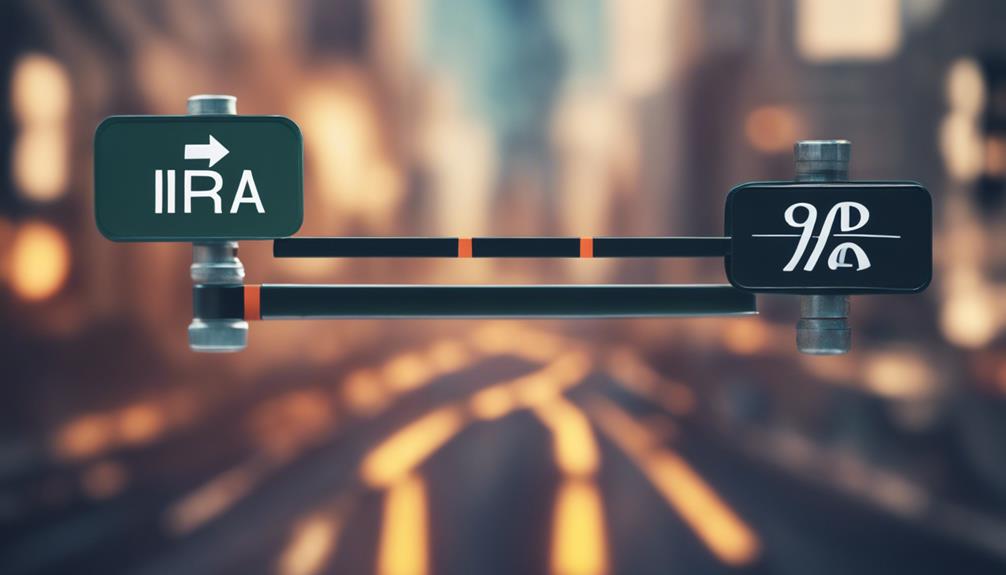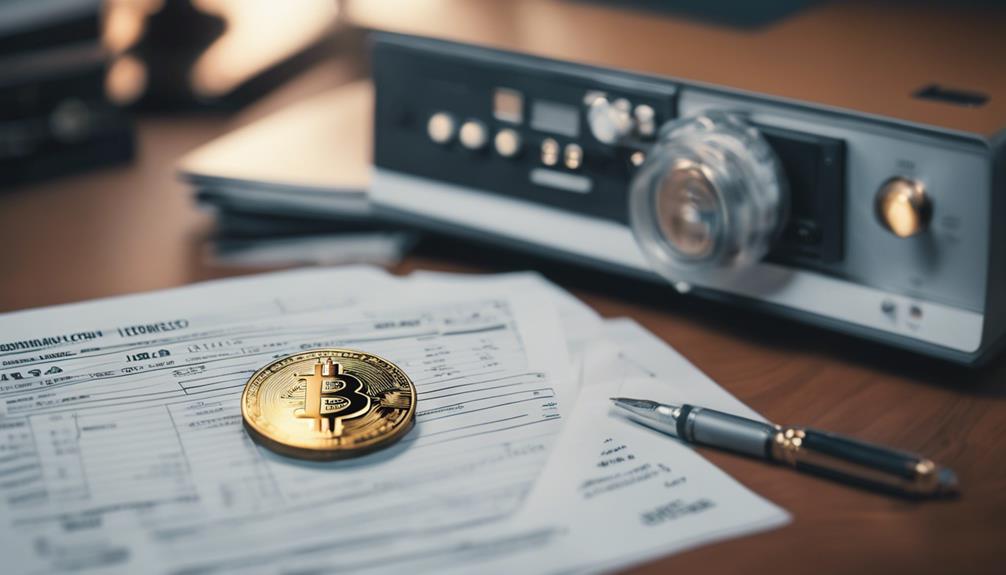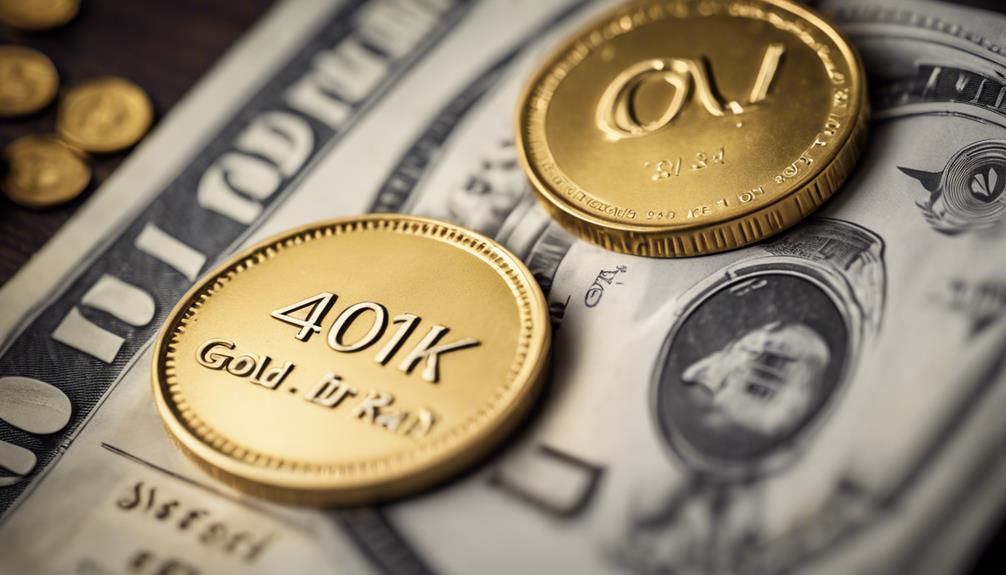Transferring your **traditional IRA** to a **Bitcoin IRA** can be a smart move for incorporating cryptocurrency into a **tax-advantaged retirement account**. This transition allows you to take advantage of the potential benefits of investing in Bitcoin for your future financial goals. By understanding the **tax implications** and the differences between direct and indirect rollovers, you can make educated decisions to optimize your retirement savings. Switching to a Bitcoin IRA offers growth that is tax-deferred, opportunities for diversification, and the potential for higher returns. Consider exploring how you can maximize your investments through a Bitcoin IRA for a strong retirement plan.
Key Takeaways
- Direct rollovers to Bitcoin IRAs avoid immediate taxes or penalties.
- Understand tax implications and regulations for smooth rollovers.
- Tax-free movement of funds from Traditional IRAs to Bitcoin IRAs.
- Tax advantages include tax-free buying/selling and growth within Bitcoin IRAs.
- Ensure compliance and research custodians for secure Bitcoin IRA setup.
Understanding IRA Rollovers to Bitcoin

When considering the process of transferring funds from a traditional IRA or employer-sponsored plan to a Bitcoin IRA, understanding the intricacies of IRA rollovers to Bitcoin is essential.
Rollovers to a Bitcoin IRA can typically be achieved without incurring immediate taxes or penalties, making them an attractive option for individuals looking to diversify their retirement funds.
Direct rollovers, particularly between retirement accounts, are often recommended to sidestep potential tax consequences that could arise from indirect rollovers.
It is worth noting that while rollovers from non-Roth IRAs to Bitcoin Roth IRAs may result in taxes, transfers between Roth IRAs are generally tax-free.
Therefore, comprehending the tax implications and regulations surrounding IRA rollovers is critical before initiating the transfer of funds to a Bitcoin IRA.
Tax Implications of Bitcoin IRAs

When considering the tax implications of Bitcoin IRAs, it is essential to understand the Bitcoin IRA tax rules and the potential tax advantages associated with investing in Bitcoin through an IRA.
These rules dictate how funds are transferred and whether tax consequences will arise, guiding investors in making informed decisions about their retirement savings.
Bitcoin IRA Tax Rules
Rolling over a Traditional IRA to a Bitcoin IRA typically does not incur tax implications, making it a favorable option for investors seeking to diversify their retirement portfolio into cryptocurrency. Non-Roth funds from an IRA or employer plan can be transferred to a Bitcoin Traditional IRA without taxes. Similarly, Roth funds from a Roth IRA or employer plan can also be rolled over into a Bitcoin Roth IRA tax-free.
However, a taxable event arises if non-Roth funds are moved into a Roth IRA. It's important to note that SIMPLE IRAs must be in existence for at least two years before becoming eligible for a rollover. Understanding these Bitcoin IRA tax rules can help investors make informed decisions when considering transferring their retirement funds into cryptocurrency.
Tax Advantages of Bitcoin
Bitcoin IRAs provide investors with significant tax advantages through the tax-free buying and selling of bitcoin within the IRA until withdrawal. By utilizing a Bitcoin IRA, individuals can benefit from tax-deferred growth, potentially leading to tax advantages upon retirement. It is important to maintain compliance with existing regulations to preserve these tax advantages and avoid penalties.
Understanding the tax implications of investing in bitcoin through a Bitcoin IRA is vital for maximizing returns and minimizing tax liabilities. When considering retirement savings, exploring the tax advantages offered by a Bitcoin IRA can be a strategic approach to diversifying one's portfolio while also potentially reducing overall tax burdens in the long term.
Direct Vs. Indirect Rollovers

Direct rollovers in the domain of retirement accounts involve the smooth transfer of funds between designated accounts, allowing for efficient movement of assets without triggering tax implications. Unlike indirect rollovers, which involve funds passing through the account holder before being transferred, direct rollovers are not limited by the one-per-year rollover rule.
One significant advantage of opting for a direct rollover is the avoidance of potential IRS scrutiny and the constraints associated with indirect rollovers. To execute a direct rollover effectively, individuals can request a check made out directly to the new Bitcoin IRA custodian for employer plan funds or arrange a direct wire transfer for IRA funds.
Understanding the mechanics of direct rollovers is important for managing the process smoothly and transferring retirement funds into a Bitcoin IRA without incurring tax implications. By opting for a direct rollover, investors can streamline the transfer of their retirement savings into a Bitcoin IRA while minimizing the risk of triggering unnecessary taxes or penalties.
Benefits of Transitioning to a Bitcoin IRA

Shifting to a Bitcoin IRA offers tax advantages, diversification in your portfolio through exposure to a different asset class, and the potential for high returns over the long term.
By incorporating Bitcoin into your retirement strategy, you can benefit from its growth potential while also hedging against economic uncertainties and inflation risks.
Embracing a Bitcoin IRA allows you to tap into the evolving cryptocurrency market and explore new avenues for investment within your retirement savings plan.
Tax Advantages of Bitcoin
When considering the advantages of moving your IRA to a Bitcoin IRA, one key benefit worth noting is the potential for tax-deferred growth and tax-free withdrawals.
By migrating traditional retirement accounts to a Bitcoin IRA, investors can enjoy the tax advantages of traditional accounts while tapping into the diversification benefits and long-term growth potential of cryptocurrency.
Shielding gains from taxes until distribution allows for the maximization of investment growth within a self-directed IRA structure.
This strategic move not only aligns with the evolving financial landscape but also offers the opportunity to leverage the potential of Bitcoin within a tax-advantaged framework, setting the stage for a robust retirement portfolio.
Portfolio Diversification With Bitcoin
Diversifying your investment portfolio by incorporating Bitcoin through a Bitcoin IRA can offer numerous benefits beyond traditional asset classes. Bitcoin's non-correlation with traditional markets provides a hedge against economic uncertainty, making it a valuable addition to retirement savings.
Investing in Bitcoin through an IRA exposes investors to a rapidly evolving digital asset class with the potential for long-term growth. Holding Bitcoin in an IRA also offers protection against inflation, as the cryptocurrency tokens have a limited supply, unlike fiat currencies.
Potential for High Returns
Investors looking to enhance their retirement savings may discover the potential for high returns by integrating Bitcoin into their IRA. By incorporating a Bitcoin IRA, individuals have the opportunity to diversify their retirement portfolio and potentially benefit from the unique properties of Bitcoin, such as its scarcity and decentralized nature. This innovative technology offers growth potential as a tax-advantaged investment within a retirement account. The historical performance of Bitcoin has shown significant growth, making it an appealing option for long-term investment. Shifting to a Bitcoin IRA allows investors to take advantage of the increasing adoption of cryptocurrencies as a store of value, potentially leading to higher returns compared to traditional assets.
| Benefits of Bitcoin IRA | ||
|---|---|---|
| High Returns | Diversification | Tax-Advantaged |
Maximizing Bitcoin Holdings in an IRA

Considering the potential benefits of consolidating and optimizing retirement accounts to increase exposure to bitcoin in a Bitcoin IRA, prudent financial planning is essential for maximizing bitcoin holdings. To achieve this goal, individuals can consider the following strategies:
- Liquidate Old Accounts: Evaluate and liquidate old retirement accounts to invest the proceeds into a Bitcoin IRA.
- Roth Conversion vs. Traditional IRA: Compare the benefits of Roth conversion and Traditional IRA for maximizing bitcoin investments within a retirement account.
- Backdoor Contributions: Explore the option of making backdoor contributions to a Bitcoin Roth IRA to increase exposure to bitcoin.
- Consolidate Accounts: Strategize on consolidating existing retirement accounts into a Bitcoin IRA to enhance and maximize bitcoin holdings efficiently.
Setting Up a Bitcoin IRA

When establishing a Bitcoin IRA, selecting a custodian that permits cryptocurrency investments is an important initial step in the process. It is essential to provide accurate personal and banking information during the account setup to guarantee compliance and security. Before committing to a specific custodian, research their offerings thoroughly to align with your financial goals. Comparing fees among custodians is also crucial to make an informed decision and maximize your investment potential. To assist you further in understanding the process, here is a table outlining key considerations when setting up a Bitcoin IRA:
| Consideration | Description |
|---|---|
| Account Types Offered | Explore whether the custodian offers Traditional, Roth, or other IRAs. |
| Cryptocurrencies | Check which cryptocurrencies are supported for investment in the IRA. |
| Exchanges | Evaluate the exchanges the custodian partners with for trading purposes. |
| Fees | Understand the fee structure, including maintenance fees and transaction costs. |
Comparing Different Bitcoin IRAs

When evaluating different Bitcoin IRAs, the variety in custodians, storage solutions, and exchange options plays a significant role in influencing investors' decision-making processes. It is essential to compare various aspects such as fee structures, cryptocurrency investments, security measures, regulatory compliance, and customer reviews before choosing a Bitcoin IRA provider.
Consider the following when comparing different Bitcoin IRAs:
- Custodians: Look into the reputation and reliability of the custodians associated with each Bitcoin IRA.
- Storage Solutions: Evaluate the storage options offered by different providers, such as cold storage or multi-signature wallets.
- Exchange Options: Consider the available exchange options for buying, selling, and trading digital assets within the IRA.
- Fee Structures: Compare the fee schedules of different Bitcoin IRAs to understand the costs associated with managing your cryptocurrency investments.
Custody Considerations for Bitcoin IRAs

To make informed decisions regarding Bitcoin IRAs, investors must carefully assess the custody considerations associated with selecting a reputable custodian to securely manage their cryptocurrency assets. Custodians for Bitcoin IRAs offer secure storage solutions like cold storage wallets to protect digital assets. It is important to choose a custodian that provides insurance coverage to safeguard against potential losses or security breaches. Additionally, custodians ensure compliance with IRS regulations for holding digital assets in retirement accounts, such as Bitcoin IRAs. Proper custody arrangements are vital for protecting Bitcoin holdings within an IRA from theft, fraud, or unauthorized access.
| Aspect | Description |
|---|---|
| Custodian | Select a reputable custodian for secure management of Bitcoin holdings. |
| Secure Storage | Utilize cold storage wallets for safekeeping digital assets. |
| Insurance Coverage | Opt for custodians with insurance coverage to protect against losses. |
| IRS Regulations | Maintain compliance with IRS rules for holding digital assets in IRAs. |
| Custody Arrangements | Establish secure custody arrangements to prevent theft or unauthorized access. |
Tax Considerations for IRA Rollovers

Consideration of the tax implications involved in rolling over funds from traditional IRAs or employer plans into a Bitcoin IRA is essential for maximizing the benefits of your retirement investment strategy. When contemplating IRA rollovers, several tax considerations come into play:
- Rolling over non-Roth funds from an IRA or employer plan into a Bitcoin Traditional IRA is typically tax-free.
- Roth funds from a Roth IRA or employer plan can be rolled over into a Bitcoin Roth IRA without incurring taxes.
- If non-Roth funds are rolled into a Roth IRA, it may trigger a taxable event.
- SIMPLE IRAs must be in existence for two years before they can be rolled over into a Bitcoin IRA.
Understanding the tax implications of different types of IRA rollovers is vital for optimizing your retirement savings strategy. By carefully considering the tax consequences of each rollover scenario, you can make informed decisions that align with your long-term financial goals.
Frequently Asked Questions
Can I Transfer My IRA Into Bitcoin?
Yes, you can transfer your traditional IRA or Roth IRA into a Bitcoin IRA. This process involves moving funds from your current IRA custodian to a Bitcoin IRA custodian.
By transferring your IRA into Bitcoin, you can diversify your retirement portfolio with cryptocurrency. Make sure the chosen Bitcoin IRA custodian supports the type of IRA you wish to transfer.
Consult with a financial advisor or tax professional to understand the implications and benefits of this transfer.
Is It a Good Idea to Have a Bitcoin Ira?
Prior to making a decision to hold Bitcoin in an IRA, it is crucial to assess your risk tolerance and consult with a financial advisor.
Investing in a Bitcoin IRA can offer benefits such as diversification and long-term growth potential. Bitcoin's lack of correlation with traditional assets can help reduce risk in a retirement portfolio.
Additionally, tax advantages like deferring capital gains taxes make it a compelling option for individuals looking to safeguard their wealth.
Can I Buy Bitcoin in My Traditional Ira?
Certainly. Yes, you can purchase Bitcoin within a Traditional IRA by utilizing a self-directed IRA custodian. This option allows for diversifying your portfolio with alternative investments like Bitcoin while maintaining tax advantages.
It's important to adhere to IRS regulations when incorporating Bitcoin into your IRA. Seeking advice from a financial advisor is recommended to confirm a well-informed decision aligning with your retirement goals and financial strategy. Additionally, understanding the bitcoin IRA regulations overview is crucial to ensure compliance and avoid potential penalties. This includes being aware of contribution limits, prohibited transactions, and custodial requirements specific to cryptocurrency investments in retirement accounts. Taking the time to educate yourself and consult with professionals can help you maximize the benefits of incorporating Bitcoin into your IRA while minimizing risks.
How Do I Set up a Bitcoin Ira?
To establish a Bitcoin IRA, choose a custodian supporting cryptocurrency investments. Provide personal and banking details for account creation. Confirm that the account type, exchanges, and cryptocurrencies align with financial goals. Compare custodian fees to make an informed decision.
Thoroughly research custodians to find the best fit for Bitcoin IRA requirements. This process involves careful consideration to align your retirement objectives with the right custodian and investment options.
Conclusion
To sum up, contemplate converting your traditional IRA to a Bitcoin IRA for potential growth and diversification. Carefully assess the tax implications and custody considerations before making the switch.
By maximizing your Bitcoin holdings within an IRA, you can secure a potentially lucrative retirement investment. Explore different Bitcoin IRA options and seek guidance to set up your account efficiently.
Take the necessary steps to secure your financial future with a Bitcoin IRA.









